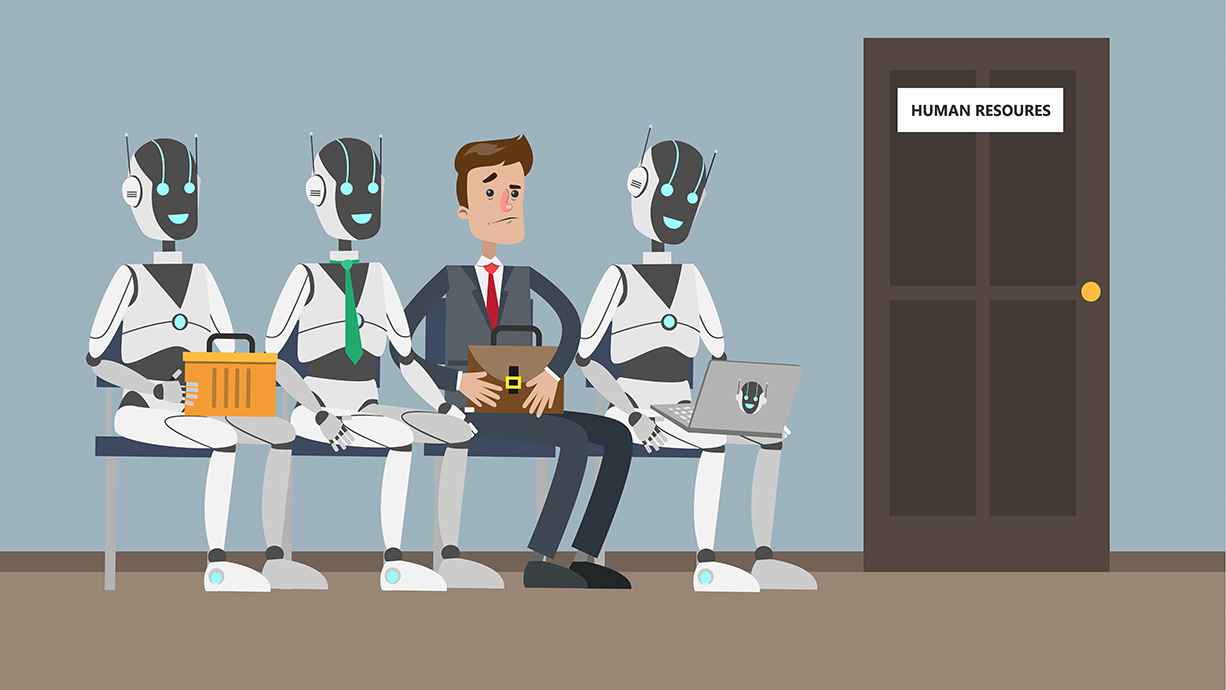
When you think of Artificial Intelligence, you might think of Siri, Google Home or the mysterious Facebook Algorithm. All of them serve a certain purpose in their own niche. They are still seen as forms of Narrow AI, something I wrote about in a previous article and are — in most cases — mere tools or gadgets for us. However, when talking about Artificial Intelligence, you might also think of your job and how AI will affect it. But is Artificial Intelligence going to become your next colleague or will it be competing for your position, leaving you without a job?
Losing your job to technology isn’t new
A lot of people have already lost their jobs to technological innovations. Not specifically AI, but more or less any type of innovation. With the arrival of electricity, we opened up the gates for automation as the major game-changer, especially when it comes to the job market. We used to have Switchboard operators who would connect your call to the receiving end. They were competed out of their job roles by automated switchboards. What about “ Knockeruppers” — people who used to have long poles to tap your window or fling peas at your bedroom aperture to wake you up. Their job was to be your alarm clock back in the early 1900s. Imagine that! Last one: a signalman. Someone who would manually switch the train tracks to get the trains on the right track in the correct direction.
Losing your job to technological advancements isn’t new. For most companies, replacing certain jobs to more efficient machines is unavoidable. For humans, it’s not so bad either. Take the old (really old) jobs for example. Loggers, Signalman and Lamplighter, all of those were jobs that needed 0% human capabilities. No empathy, no creativity, no sense of ethics or morals. A machine or robot is far quicker and more reliable when it comes to switching train tracks, connecting calls or waking people up with noises. People shouldn’t want to even compete with machines when it comes to these jobs. They require no human traits, so best to leave it up to the non-human employees.
“We used to have Switchboard operators who would connect your call to the receiving end. They were competed out of their job roles by automated switchboards.”
Gaining jobs thanks to technology
A lot of jobs — which we now find normal and almost take for granted — are created through technology. As a matter of fact, I think MOST current jobs are at least at a higher level (if not entirely created) thanks to technological innovations, machines, automation and other forms of advancement. Let me paint a picture: today there are 412 job openings for Mobile App Developer, just in the Netherlands. And that’s only on the first Google hit. 412 openings for a job role that’s not older than most Millenials are. So, early 2020 at least 412 dutch app developers could have a job with great pay thanks to technology. My best guess is also that they’ll be working on apps that are doing things we used to do by hand. It’s a natural process. We create technology that puts us out of certain jobs. Then we create new jobs around that new technology. We are great at creating jobs for ourselves. Did you think people would get a better-than-full-time salary for making videos on youtube of themselves playing videogames?
What about people getting paid to shoot video images with Drones? Hosting professional podcasts, working full-time in Social Media Marketing or 3D printing product prototypes. All of the above are jobs that were created thanks to the arrival of technology. Some jobs just get more modern and use the help of technology to make the work more efficient, fun or more scalable. Other jobs run entirely on platforms that aren’t even 5 years old. Technology is not a threat that’s taking over our precious jobs, it’s a chance to change and improve the work we do.
We cannot imagine jobs 30 years from now
The rise of Artificial Intelligence is just the same as the rise of steam power, electricity and automation. The biggest difference is just the way we adapt to it and communicate about it. We’re getting more and more used to quick changes in technology and our daily lives, so we’re quick to accept innovations into our lives. On the other hand, we have Social Media. That means that an innovation in India that gets published on TikTok or Instagram could reach any other country in seconds, meaning that the awareness of new possibilities spreads within minutes rather than days or weeks.
Besides the spreading of information, we have Artificial Intelligence as a diverse type of technology. Steam power was pure power to move an object. Electricity enabled electrical power and opened up the doors for automation and robotization. Now, living in 2020, we have AI which is no longer just a physical form of innovation. For the first time, we are working on technology that is someday supposed to become as smart as — or even smarter than — we are. While other innovations were made to help us become faster, stronger and travel further, now we’re working on a level that could think for us. We’re not there yet, as I mentioned before, but someday in the foreseeable future, we’re supposed to have an intellectual conversation with a robot or Smart Speaker. And this will bring about new jobs that were created through these forms of technology. Maybe we’ll have jobs for marketers who specialize in Smart Speakers for targeting ads or Customer Service reps who work hand-in-hand with Artificial Intelligence to solve your problems quicker and more accurately. We couldn’t predict people earning money on Youtube and Instagram, we can’t predict how we’ll be making money thanks to AI.
“Some jobs just get more modern and use the help of technology to make the work more efficient, fun or more scalable.”
Employers: make sure to incorporate humans
If you’re running a company or managing a team of people, please consider technology as an addition to human capital rather than a direct competitor. Automation, Robots, Artificial Intelligence…all of these are just tools. Tools that humans can use to help a team reach goals quicker, better or with less hassle. We can’t replace humans with robots one-on-one and think that our companies are going to grow. What we SHOULD do is use technology to solve problems where technology is simply the best fit. That way, humans can focus on where they are the best fit. AI will probably be able to do redundant tasks, learn from mistakes and prevent errors. Humans can then be creative, focus on customer relationships and create new ways for the company to grow.
If we have humans and robots compete on efficiency, robots will win 10 out of 10. But the reason for that is simple: robots are built for efficiency. If we have robots try to build genuine relationships, they will fail 10 out of 10 times. Please don’t see AI as a reason to replace people, see it as a reason to create time for humans to accelerate with the help of human skills.
Employees: make sure to develop your human skills
There’s also space for humans to innovate. Not on a technological level, but innovate on a human level. This means that we can leverage technology in the areas where it’s superior to humans- like calculating or avoiding errors- so we can focus on being human. But how does “being human” work? We haven’t truly been ourselves for a while. Humans are very creative, empathetic, and capable of building relationships. These are the key elements for the future growth of companies. While businesses are competing on the same level, they have become interchangeable. If all supermarkets lose their cashiers, offer the same product for the same prices, and make the same type of commercials…what’s different other than a company logo and the physical location? If we leverage human traits in that area, we can create genuine experiences that make people want to come to a specific store or establishment.
This means that “we” need to start developing our human traits in a way that separates us from Artificial Intelligence. We need to understand what a true relationship means, how it’s built, and in what way a company can benefit from it. Also, we’re going to have to develop more soft skills. Hard skills, like calculating or heavy lifting, are preserved for technology. We’re good at it, but it’s not what sets us apart. If we focus on psychology, marketing, creative elements, and other human-specific traits, we can make ourselves indispensable for any employer out there, even if their company is jam-packed with Artificial Intelligence.
What do you think?
Is Artificial Intelligence the reason we’ll all be unemployed within a few decades, or are we going to make a natural transition just like in the time of the Knockeruppers?
